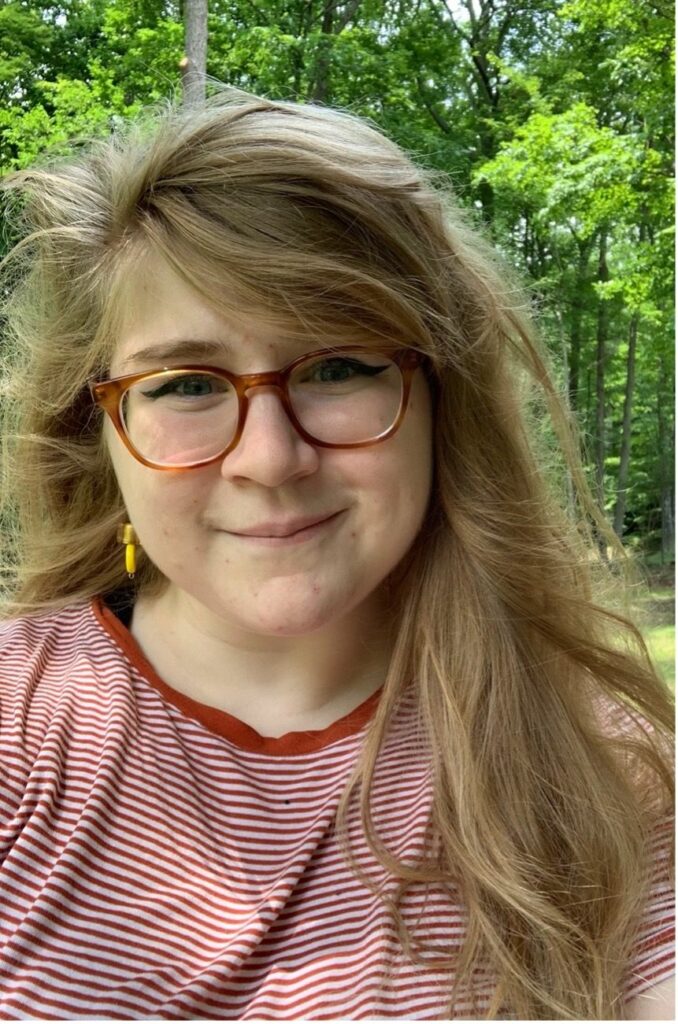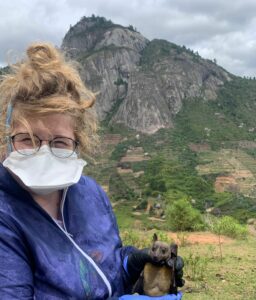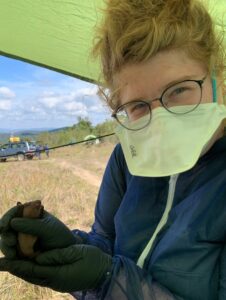
Gwenddolen Kettenburg
University of Chicago
Chicago, IL, USA
Ph.D Student
gkettenburg[at]uchicago.edu
Currently, I am a Ph.D student in Ecology and Evolution at the University of Chicago. I am advised by Dr. Cara Brook and currently exploring longitudinal viral shedding dynamics in Madagascar’s three endemic fruit bats: Pteropus rufus, Rousettus madagascariensis, and Eidolon dupreanum. I am particularly interested in elucidating maintenance of RNA viruses, chiefly filoviruses, coronaviruses, lyssaviruses, and henipaviruses. I have also been working on describing novel henipaviruses from urine samples collected from these fruit bats, in collaboration with the Chan Zuckerberg Biohub and the NIH, and will soon start a project on determining the role of constitutive immunity in the evolution of higher viral growth rates in bat cell lines. I enjoy teaching and participate in mentoring/lecturing Malagasy graduate students through our lab’s two programs: Ecological & Epidemiological Modeling in Madagascar (E2M2), and Coding 4 Conservation (C4C).
I had always been interested in viruses and ecology, and my research interests span all aspects of disease ecology and evolution, with a particular interest in holding a One Health view on these topics. In my undergraduate at Keystone College in rural Pennsylvania, I was exposed to field and molecular research through surveillance studies in deer ticks (Ioxdes scapularis) for Borrelia with Dr. Vicki Stanavitch and Dr. Darryl Horn. Subsequently, I did a REU in the summer between my undergraduate and master’s with Dr. Brian Leydet at SUNY-ESF, which helped expand my molecular toolbox while continuing to work on tick pathogens. My master’s on the pathogenesis of H5N1 influenza in human precision cut lung slices was completed at the University of Pittsburgh advised by Dr. Simon Barratt-Boyes. After graduating, I stayed as a research technician and worked in a couple of projects in assessing universal flu vaccine success in NHP’s exposed to aerosolized H5N1 influenza. This allowed me to get extensive experience in rigorous lab safety in a BSL3+ lab working with zoonotic pathogens. Once the COVID-19 pandemic began, our unique ability to work with high biosafety level pathogens allowed me to work on projects on SARS-CoV-2 infectivity of asthmatic lung epithelial cells, with the interest of testing treatments.
As one of the student representative for GBatNet, I am pleased to co-lead two GBatNet working groups which are; “How has the bat immune system evolved and influenced bat diversity” and “How old is this bat”.
Selected recent publications:
Cecilia A. Sánchez, Kendra L. Phelps, Hannah K. Frank, Marike Geldenhuys, Megan E. Griffiths, Devin N. Jones, Gwenddolen Kettenburg, Tamika J. Lunn, Kelsey R. Moreno, Marinda Mortlock, Amanda Vicente-Santos, Luis R. Víquez-R, Rebekah C. Kading,Wanda Markotter, DeeAnn M. Reeder, and Kevin J. Olival. 2024. Advances in understanding bat infection dynamics across biological scales. Proceedings of the Royal Society B Biological Sciences. 291(Issue 2018). doi:https://doi.org/10.1098/rspb.2023.2823
Horigan Sophia, Kistler Amy, Ranaivoson Hafaliana Christian, Andrianianina Angelo, Andry Santino, Kettenburg Gwenndolen, Raharinosy Vololoniaina, Randriambolamanantsoa Tsiry Hasina, Tato Christina M, Lacoste Vincent, Héraud, Jean-Michel, Dussart Philippe, and Brook Cara E. 2023. Detection, characterization, and phylogenetic analysis of a near-whole genome sequence of a novel astrovirus in an endemic Malagasy fruit bat, Rousettus madagascariensis. bioRxiv preprint. doi: https://doi.org/10.1101/2023.10.27.564436
Gwenddolen Kettenburg. 2023. Digest: Salamanders reveal novel trajectories of amphibian MHC evolution. Evolution. doi: https://doi.org/10.1093/evolut/qpad033
Kettenburg Gwenddolen, Kistler Amy, Ranaivoson Hafaliana Christian, Ahyong Vida, Andrianiaina Angelo, Andry Santino, DeRisi Joseph L, Gentles Anecia, Raharinosy Vololoniaina, Randriambolamanantsoa Tsiry Hasina, Ravelomanantsoa Ny Anjara Fifi, Tato Christina M, Dussart Philippe, Heraud Jean-Michel, and Brook Cara E. 2002. Full genome Nobecovirus sequences from Malagasy fruit bats define a unique evolutionary history for this coronavirus clade. Frontiers in Public Health. doi: https://doi.org/10.3389/fpubh.2022.786060
Jacqueline Corry, Gwenddolen Kettenburg, Amit. A Upadhyay, Megan Wallace, Michelle M. Marti, Elizabeth R. Wonderlich, Stephanie J. Bissel, Kyndal Goss, Timothy J. Sturgeon, Simon C. Watkins, Douglas S. Reed, Steven E. Bosinger, Simon Barratt-Boyes. 2022. Infiltration of inflammatory macrophages and neutrophils and widespread pyroptosis in lung drive lethality in nonhuman primates. PLoS Pathogens. doi: 10.1371/journal.ppat.1010395


